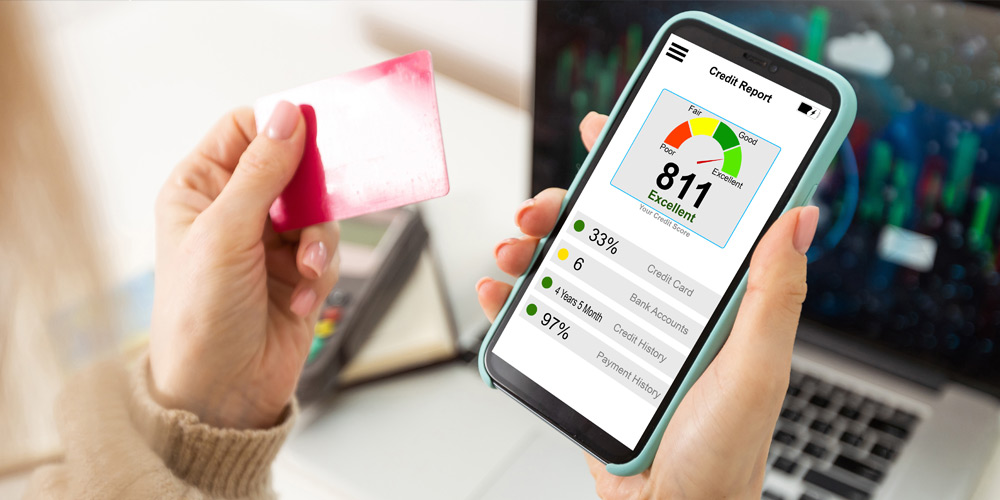Credit cards are sort of like fire. When used properly, they can be a valuable tool. When used irresponsibly, they can set your finances ablaze. Some credit card tips are relatively obvious, like making sure to pay your bill in full and on time or never spending too much. Other tips, like avoiding closing credit cards, are less intuitive.
When you close credit cards, it reduces your available credit which could negatively affect your credit utilization and potentially cause your credit score to drop. That means it might be a better idea to keep your credit cards open unless you’ll be tempted to misuse them, they have an annual fee, or you suspect they’ve been compromised.
How do credit cards affect your credit utilization ratio?
When you qualify for a credit card, the card issuer will approve you for a line of credit with a credit limit based on your credit report. When you purchase with your credit card, you use a portion of your credit limit. The amount of credit used compared to the total available credit is known as credit utilization ratio. It is one of the factors that determines your credit score, or FICO score, which is a figure that many lenders use to decide whether to loan you money and at what rate.
A credit utilization rate below 30% is generally recommended. If you have two credit cards, both with $,1000 credit limits, or $2000 total and you spend around $600 on your credit cards each month, your credit utilization ratio will be 30%. Close one of those cards, and your credit utilization ratio will jump to 60% even though you haven’t spent any more money.
If you carry an outstanding balance on your card from month to month, you’ll be charged interest, but as long as you pay your bill in full each month and on time, you’re generally better off keeping credit cards open.
What if your credit card has an annual fee?
If you have a credit card with an annual fee that you’re no longer using, it’s probably worth closing that card. A temporary hit to your credit score is better than throwing money for an unused credit card every year, especially if it’s a high annual fee.
Many rewards credit cards come with annual fees, so you should do the math to be certain the rewards program is worth it for you. Financial counselor Todd Christensen offered this as one of the reasons he recommends closing a credit card: “you're paying an annual fee that outweighs the rewards your card earns on purchases you would make even without the card.”
What if you can’t control your credit card usage?
Not everyone can properly manage their credit card accounts. If you are tempted to spend outside your means, it could be worth closing your cards rather than drowning in credit card debt.
Credit cards can be valuable tools for raising your credit score or accessing extra funds in an emergency. So, if possible, you should consider other ways to limit your credit card use. Closing all of your credit cards should be a last resort, but Christensen recommends it if you can’t see any other way to get your finances under control.
“People who carry too many cards and want to avoid the temptation of overspending may benefit from closing an account,” says Ahren Tiller, founder and supervising attorney at The Bankruptcy Law Center. “If you think closing a credit card will do good to your financial and mental wellbeing, you can do so but remember to consider the impact on your credit score.”
What if your credit accounts are compromised?
If you’ve been the victim of identity theft, closing credit cards may quickly change from a bad idea to a necessity.
Whether your credit card number was stolen or the card itself was stolen or lost, you should immediately change the password on your account. Contact your credit card issuer so they can cancel your account and send you a new card with a new number.
Keep an eye on your accounts and your credit report to spot any fraudulent charges. You are entitled to a free annual credit report from each of the major credit bureaus; Experian, TransUnion, and Equifax. Check annualcreditreport.com to receive your free credit reports, and if you notice any false charges, contact the credit bureaus to have them removed.
What happens to your joint credit cards when you get divorced?
“It’s time to close a joint credit card account if you’re separating from your spouse or partner,” Tiller says. “Whatever is charged on the account, you’ll still be responsible for it even after divorce or separation, so the safest option to avoid that is to close the credit card account.”
Credit scores are tied to your Social Security number. There’s no such thing as a joint credit score, but that doesn’t mean your spouse’s financial habits won’t affect you. For example, if your spouse defaults on a debt and your name is on the account too, you could be held accountable.
Depending on your credit card issuer, you may be able to remove your name from a joint account with your ex-spouse. You could also use a balance transfer to put the debt on an individual card instead of a joint card. Just make sure the joint card has a balance of zero before closing the card.
How should you close your credit cards?
Once you decide that closing a credit card is necessary, you should do so in a way that’s best for your bottom line; when you close your credit card may be even more important than how you close your credit card.
“If you're within a year of buying a house or six months of buying a car, keep the card open,” urges Certified Financial Education Instructor Kari Lorz. “Yes, closing the card will drop your score but only for a short time. You don't want to lower your score when you want it as high as possible (i.e. when getting a new loan for a large purchase).”
Once you’re ready to close your cards, be sure you do so without losing any perks.
“Redeem unused rewards on your account before canceling the card,” advises financial lecturer and founder of Physicians Thrive, Justin Nabity.
He also suggests you pay off all of your credit card balances before closing a card so the closed account won’t hurt your credit profile too much.
“To ensure that the account is closed and that your balance is $0, check your three credit reports 30 to 45 days after cancellation,” Nabity says. “You’ll be able to dispute any incorrect information on your reports with the credit bureaus.”
If you want to close a card but can’t afford to pay it off entirely at the moment, you could consider a balance transfer. That’s when you use one credit card to pay off a different one. Be aware that credit card providers may charge fees on balance transfers. Obviously, this can leave you with the roughly same amount of debt, but it might be worth considering if you have a new credit card with a lower interest rate or a higher credit limit.
How else can credit cards impact your credit report?
Aside from credit utilization ratios, credit cards can impact your credit score in other ways. One of the most significant is your payment history. If you pay your credit card bill on time and in full, it will help your credit score, while missing payments will hurt it.
Closed accounts will remain on your credit report for up to ten years if they were closed while in good standing, so your good payment habits will continue to boost your score for a while after closure. Negative payment information will remain on your report for seven years.
The length of your credit history and your credit mix are two other credit report factors that can be impacted by credit cards. The length of your credit history, or the age of your accounts, is not as important as your credit history or utilization ratio. Still, if your oldest account is a credit card, you might consider keeping it open so the average age of your accounts will be higher, though it may remain on your report for seven to ten years regardless.
Similarly, your credit mix benefits from having different kinds of credit, but remember that even a closed credit card account will remain on your report for years.
Ultimately, while your credit card affects your credit score in multiple ways, closing a credit card will only have an immediate impact on your credit utilization ratio. We hope this information will help you make the best credit card decisions you can.
Article contributors

Author of Everyday Money for Everyday People and AFCPE-Accredited Financial Counselor®, Todd Christensen has led more than 1,000 personal finance workshops and developed scores of online courses and webinars for individuals, couples, and organizations around the county since 2004.

Kari Lorz is a Certified Financial Education Instructor and runs Money for the Mamas, a site dedicated to helping moms learn about finances. Their one goal is for you to become knowledgeable and comfortable with money management strategies so that you can build a secure financial future for your family!

Ahren Tiller is the founder and supervising attorney at The Bankruptcy Law Center.

Justin Nabity, CFP®, CLU®, and ChFC®, is an experienced financial expert. He is the founder and CEO of Physicians Thrive, a financial advisory firm helping physicians in career and financial planning from contract to retirement. He has lectured at over 100 universities including Mayo Clinic and John Hopkins and has been featured on Bankrate, MSN, Forbes, and Business Insider.








